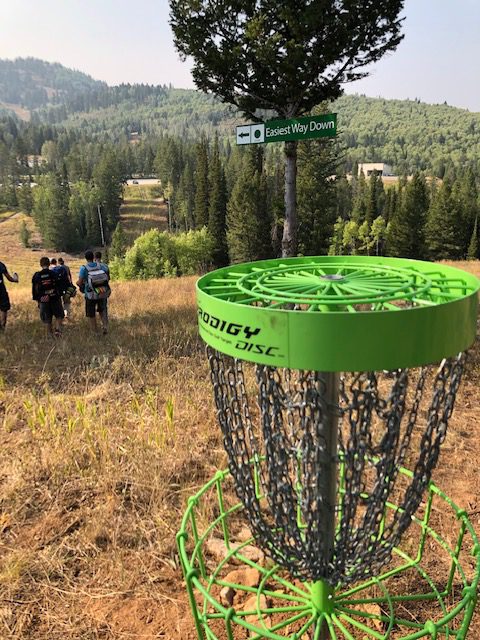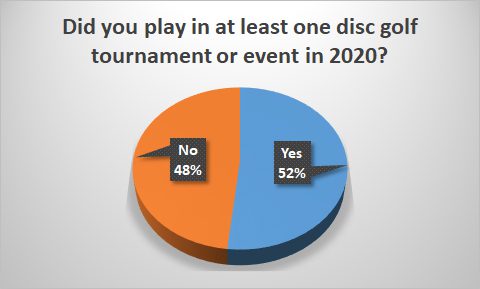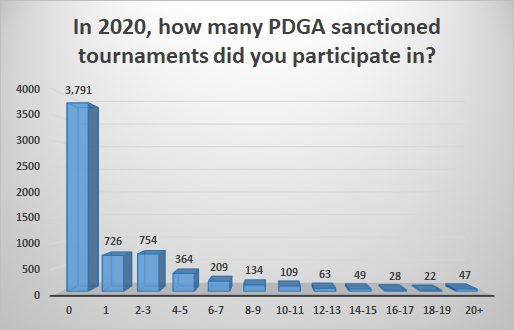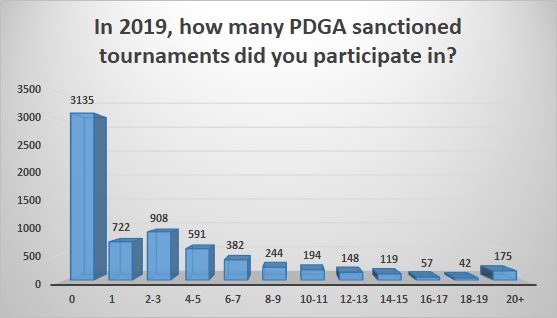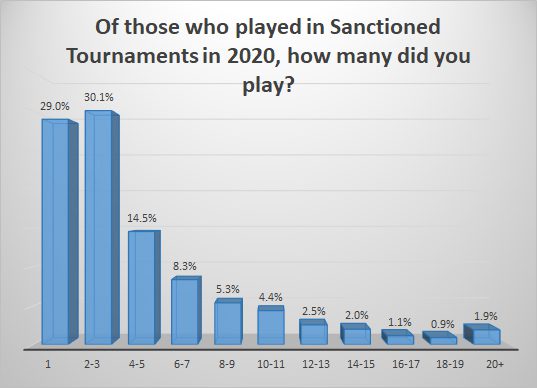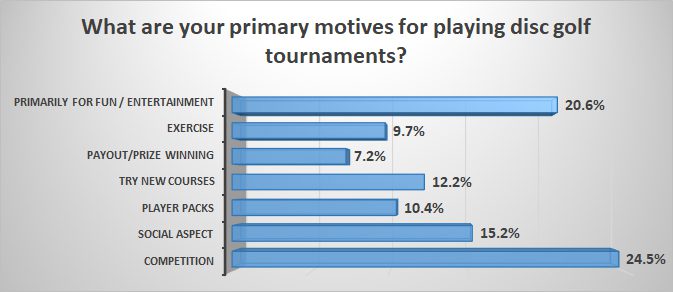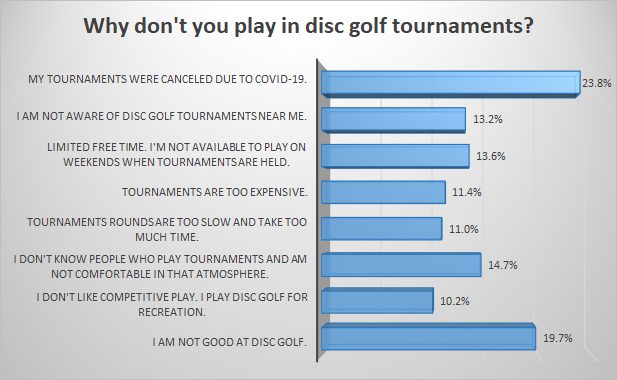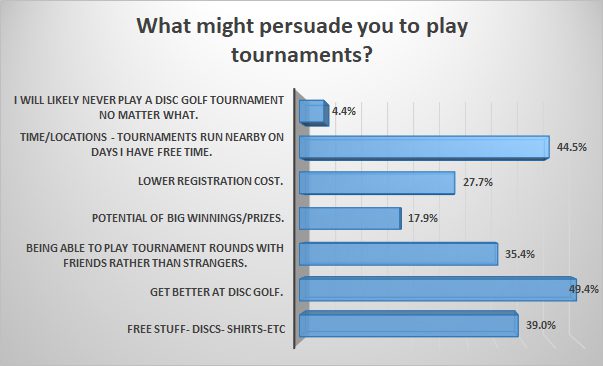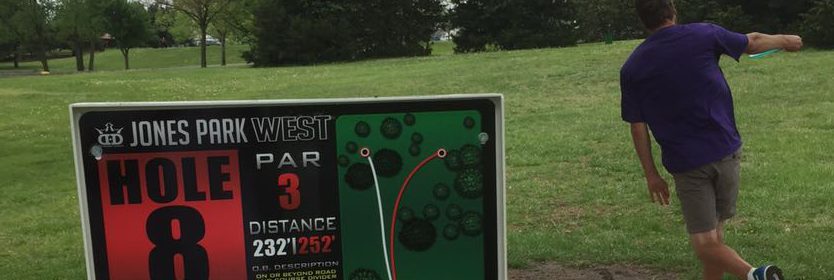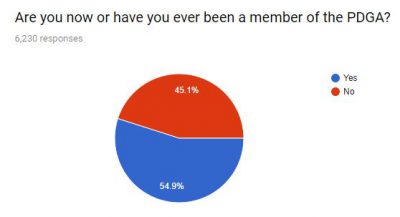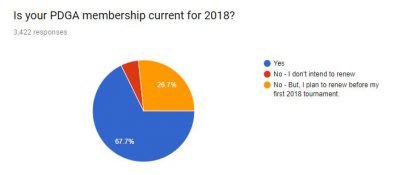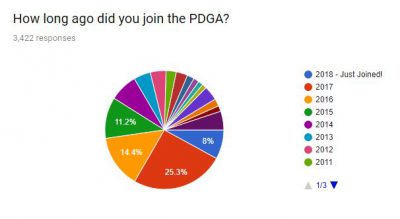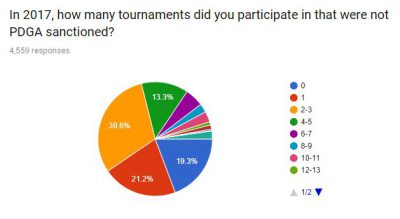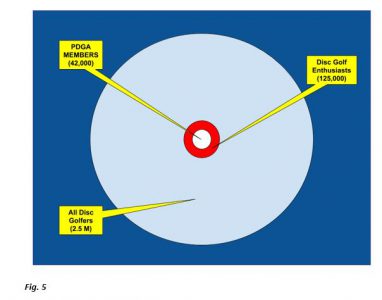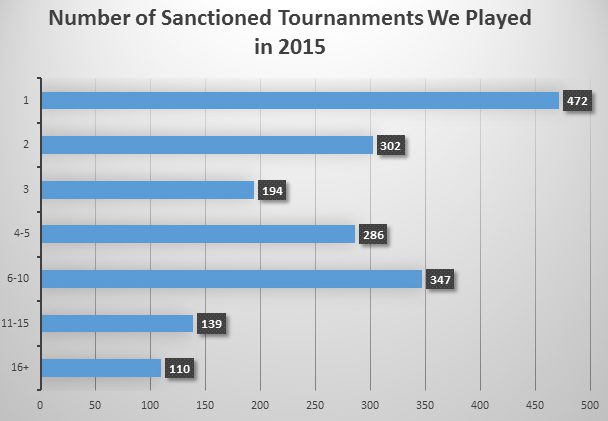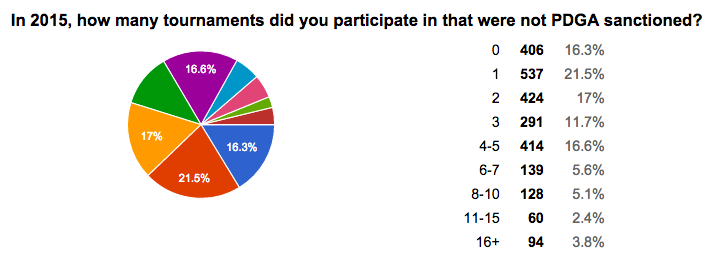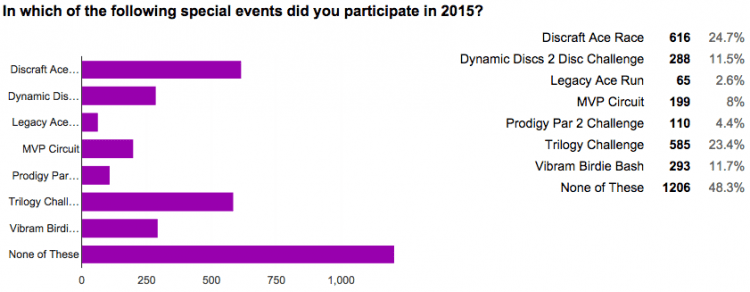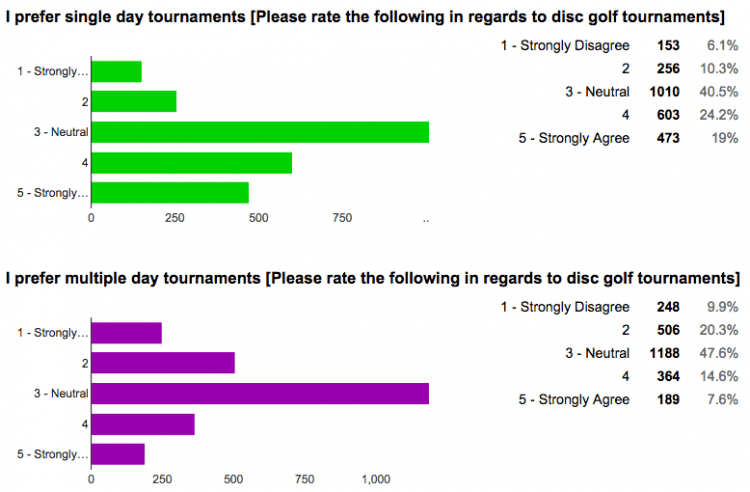It is Glass Blown Open weekend! GBO is considered one of the best events in disc golf every year. It is run well, and leaves players of all divisions happy and satisfied with their tournament experience.
Often times tournament directors wonder how to make their tournaments better and how to keep their participants happy and excited about their events. This year in the 2019 State of Disc Golf Survey we asked disc golfers questions about their tournament experiences, what they like or don’t like to see in tournaments, and what motivates them to participate in disc golf events.
This is especially pertinent to our sport, because disc golf fans aren’t just fans, they are players. Like we always say, part of what makes disc golf so great is it is very cheap and easy to play. Well, it is also very easy to get involved in local leagues and tournament play including PDGA sanctioned and unsanctioned events.
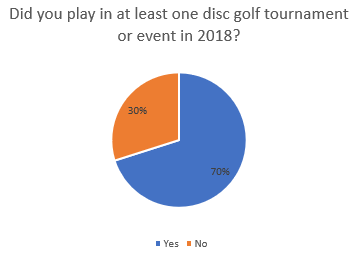
And for the most part, if we are serious enough about disc golf to take a lengthy survey, we play competitively. Of those who took the survey, we were split 70/30 with 70% of survey takers participating in at least one disc golf tournament or event in 2018. We then asked that 70% how many PDGA sanctioned events they participated in over the last year. The responses were interesting:
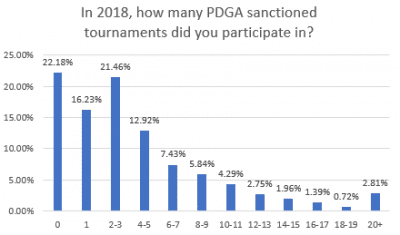
Particularly, I think it is interesting that the option that received the most selections was zero, showing that a good portion of disc golfers who are active in competitive disc golf may not be involved with the PDGA at all. Also these individuals may just participate in local specialty events like the Discraft Ace Race or Trilogy Challenge. Of course, we asked what specialty events folks participated in during 2018.
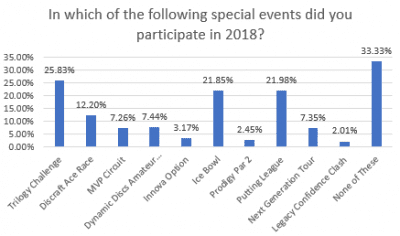
We shouldn’t be surprised to see the Trilogy Challenge as the most popular event. It has been established as a great value event that attracts both competitive and casual disc golfers. We can also see that local putting leagues have become very popular in the disc golf community. It is interesting that just 33.33% said they participated in none of these events, as it shows how popular these specialty events have become in recent years. Also, because I mentioned it previously, only 9.97% of those who said they participated in a disc golf tournament said that they didn’t participate in a PDGA sanctioned event nor in any of these specialty events. It just goes to show that there are still popular local events that do not affiliate with the PDGA.
This ties into our next question in the survey: How many tournaments did you participate in that were not PDGA sanctioned? here were your responses:
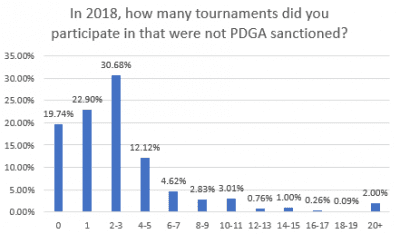
With this data, we see that slightly more people participated in tournaments that were not PDGA sanctioned than people who participated in tournaments that were PDGA sanctioned. For those of us who are involved in mainstream PDGA events, it can be easy to forget that tournaments that are not sanctioned still draw a lot of participants, and are a great resource for casual players who are wanting to work their way into the competitive disc golf world.
Motivating Factors for Playing Disc Golf Tournaments
So what motivates us to participate in disc golf tournaments? We asked, and here is how we responded:
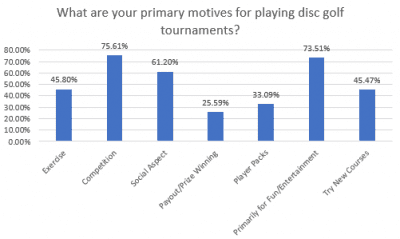
At first I was pretty shocked to see that Payouts/Prizes and Player Packs were the lowest two motivators. Those are often the two motivators that Tournament Directors try to appeal to the most when they are promoting their events. But does this data mean that we should focus on something different in our promotions?
After a little more thought, it could be argued that these low numbers are a bit misleading. First of all, who receives a player pack? For most PDGA sanctioned tournaments, only players in amateur divisions receive a player pack. Professional players usually do not receive a player pack, so most survey takers who play in the pro divisions likely aren’t motivated by player packs. And the inverse sometimes applies to Payouts/Prizes for larger events. Sometimes in order to generate larger payouts for pro divisions, TDs will make their event “Trophy Only” for their amateur divisions. This means that there are no prizes besides maybe a trophy for amateurs. These events though will often provide a more generous player pack in an effort to try and “make up” for not offering prizes. So for amateurs who are accustomed to playing in trophy only events, they would naturally not be motivated by payouts and prizes that they don’t normally see anyway.
However, all of the other motivating factors can be found at pretty much any tournament regardless of division. I think it is also worth noting that we enjoy exploring new courses when we go to tournaments enough that almost half of us listed that as one of our motivating factors. I know some smaller local tournaments have found success in using a variety of layouts and pin positions for tournaments to try and change up their course to make it feel new and different for their local players.
But at the end of the day, what most motivates us to go to tournaments is the competition, fun, and social aspects found in tournament play. So TDs should make sure to foster a fun and social environment. Obviously the nature of tournaments themselves make them competitive, but TDs can still look for ways to improve that competitive atmosphere for all divisions. TDs can also add small mini competitions like distance or putting competitions in between or after tournament rounds. Even a ring of fire offers all competitors a chance to experience some competition. I remember as a young player winning prizes in a ring of fire that included some of the best local disc golfers. It was fun to be able to say I beat them at something, even if it was as simple as a ring of fire.
We also asked survey takers to rank by importance certain aspects of tournament play. Specifically, we asked, What aspects do you consider when selecting tournaments? Here is how we responded:

I think this might be the most interesting bit of data so far today. It shouldn’t be a surprise that a well run event is what we consider to be the most important thing when we are selecting tournaments. I think this is especially important for TDs who are running events on new courses or temporary courses. It is insanely frustrating to play in an event when you aren’t 100% sure of the rules or if all OB areas are not clearly marked.
But I am kind of shocked to see that the three options that received the most “Not Important” votes were Awards/Trophies, Good Payouts, and Player Pack value. If you are an amateur who hates that the big event in your area is a trophy only event, then don’t show the TD this info. Over a quarter of tournament goers consider the Awards/Trophies in your tournament not important, and only 4% less consider good payouts not important.
From this data, what people want the most are well run and organized events that stick to the schedule and give them an opportunity to compete and enjoy each others company. So instead of trying to appeal to players by giving them the biggest player pack or payout, spend some of that time/money and turn your event into a social and competitive gem in your area.
Payout vs. Player Packs
Part of why I was surprised that payouts and player packs were the most unimportant factors is because they are part of a pretty common debate in disc golf circles–where should tournament money go? Should TD’s provide a generous player pack, or instead focus on bigger payouts across all divisions? We asked for your opinion, and here is how you responded:
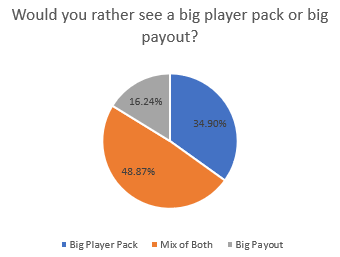
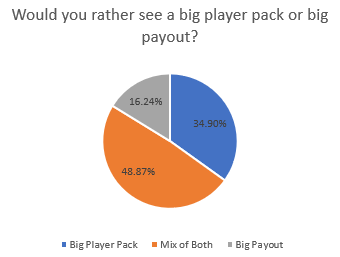
We shouldn’t be surprised that the top answer here, with almost half selecting it, is a mix of both, because everyone wants more of everything right? But when we look at those who answered just one or the other, people who favor a big player pack doubled the amount of people who prefer a big payout. This doesn’t surprise me, I think that all players benefit from a large player pack regardless of skill level. So if you are in a good position as a TD, try to create a high value for both the player packs and the payouts. But if you need to choose one or the other, most disc golfers would prefer that money going toward a generous player pack.
Another common debate within disc golf culture is how to divide tournament payouts. In other words, how deep should a tournament payout? If a tournament has a big purse that is paid out to a high percentage of the field, that means the top finishers aren’t paid as much as they would be if they paid out a smaller percentage of the field. The inverse, of course, is a shallow payout that makes for higher payouts for the top of the field. So, we asked disc golfers which they preferred, and here are the responses:
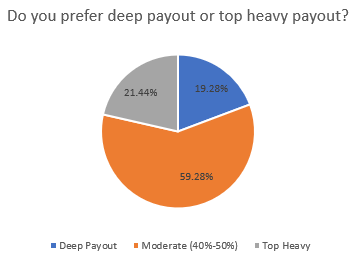
Similar to our last chart, we see that most people prefer moderation. But then the split after that is pretty even with a slight preference toward shallow payouts or even trophy only events. But for the most part, the standard 40%-50% payout is what most people want to see.
Tournament Stamp or Stock Stamp?
Now for one last tidbit of info for our Tournament Directors–How do we feel about tournament stamps compared to stock stamps in the player packs? Specifically, we asked,”As a player pack item, would you prefer a tournament stamp on a disc you don’t throw or a stock stamp on a disc of your choice?” This also gets to players having more of a choice in their player packs. So how much do we value that choice? Here is how we responded:
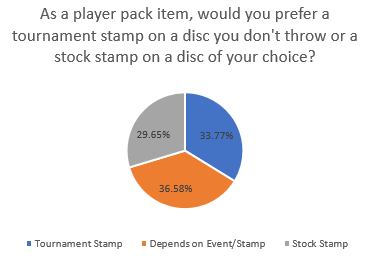
This one is pretty even across the board with people saying that it depends on the tournament and stamp coming in at the top just barely. And then there is a slight favoring of tournament stamps, which I think makes sense because it is always nice to have a more unique disc in my opinion. So if you run a good enough tournament with a nice stamp design, you can win over the neutral folks and make everyone happy, which is the goal of every TD.
But for those who prefer to have more choice in their player packs, be sure to check out a Next Generation event this year. Dave Feldberg has partnered with Infinite Discs to provide multiple options for player packs, allowing participants to choose the discs and brands included in the packs.
Why Disc Golfers Don’t Play Tournaments
Now, so far we have discussed the preferences of those who said they participated in tournaments this year, but for those who didn’t participate–why not? What kept these people from involving themselves in their local competitive disc golf scene?
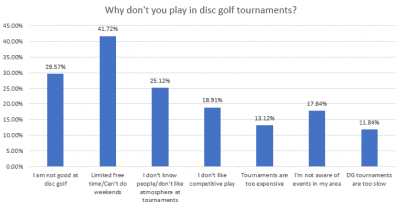
As you can see, far and away the top reason why people don’t participate in disc golf tournaments is because they don’t have enough time. Again, it shows that our sport draws competitive people, even if they don’t have time to participate in organized disc golf competitions.
And for the 29.57% of folks who didn’t play in a tournament this year because they don’t think they are good at disc golf, I have a couple of thoughts. First of all–welcome to the club because a good portion of us who play competitively also don’t think we are good at disc golf. But more importantly, if you want to improve your disc golf game, I think one of the best ways to do it is participate in your local leagues and tournaments. I remember being scared showing up to my first league, and I played awful. But the people on my card were very encouraging, and I learned so much as I kept showing up and watching disc golfers who were better than me and how they attacked the course. So don’t let your fear of not being good enough stop you. Once you set that aside and start showing up to leagues and other events, I know your game will improve. I saw it happen in myself, and I see it happen all the time.
And finally, our last stat nugget–for those who didn’t play in disc golf tournaments, what would help in convincing them to show up to future events?
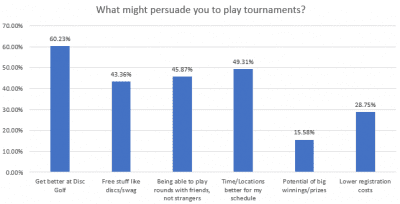
I am surprised to see that over half of people who said that they didn’t play in a tournament said that them getting better at disc golf would convince them to show up to future events. So maybe it is an issue not people thinking they aren’t good at disc golf, but rather they just don’t think they are good enough. Again, refer to my earlier discussion of how participating in competitive disc golf will improve your game. I believe that nobody should ever feel like they aren’t good enough to participate in disc golf tournaments or leagues.
We also see that time/location changes could help almost half of those who didn’t participate in disc golf events show up in the future. Of course, this is a hard thing to get right since everyone’s schedule is different.
Let Them Play With Their Friends
Another piece of interesting information is that 45.87% of folks said that they would play more if they could play with their friends rather than strangers. While it isn’t always ideal, most tournament directors allow people to request being on the same card as their friends. Even if they don’t advertise this, any TD will tell you that there are plenty of disc golfers who have no problem asking anyway. But maybe if TDs are trying to draw more casual players to their events, they can make sure they know that they will be allowed to play with their friends.
So we covered lots of data in this one! What stood out to you that I might have missed commenting on? Do you have any advice for Tournament Directors? Please let us know in the comments!
And last but not least–thank your TDs! A Tournament Director is often a thankless volunteer position. These people donate their time and energy to create a positive event for their disc golf community. They grow the sport and are trying their best to be a positive influence in their communities. So thank you TDs!
